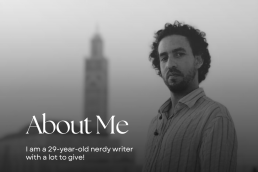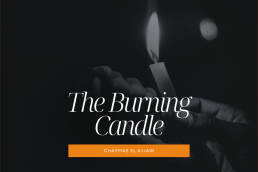Amani walked down the cobblestone pavement, looking straight ahead, even though her squinted eyes begged her to avert her gaze from the blazing sun. But Amani wouldn’t because the sight of the nearly empty street sent shivers through her spine.
It was the first time she left her grandparents’ apartment ever since a quarantine was announced because of the coronavirus, but deep down, she wished she could be like her friends, wishing to not carry the weight of her grandparents’ lives on her shoulders.
She shook her head and pushed the thought in a far corner of her mind, focusing on the grocery store that was getting closer and closer. Making her legs and hands shake. She realized that if somebody took a look at her petrified figure, they’d wonder what a sixteen-year-old girl, with a strong immune system, was so scared of. Only they couldn’t know the same girl would go back home to a diabetic grandmother and an asthmatic grandfather for whom it could be deadly.
It hit her as soon as she crossed the door, the fear radiating from everybody, how someone would warily glance behind him every now and then to make sure nobody was too close, the shopping carts overflowing with food. And even as she left the store, the scene of an old woman covering her mouth with a scarf, rummaging through the empty racks, followed her all the way home.
And it was those thoughts that lingered in the air, daring her to keep thinking, as if the dread that was making her heart explode through her skin wasn’t enough. As if crossing the apartment’s door wasn’t a challenge in itself.
Her grandparents were seated in front of the tv, watching the news that only seemed to get worse day after day. So when she was asked how it went, she nodded her head and faked a smile; too scared to recall the hollow streets, the void that stripped their neighborhood from any sign of life, and made her way to the kitchen.
As Amani returned to the living room, after thoroughly disinfecting everything she could have touched, she silently sat across from her grandmother, who was engrossed in her thread and needle, absorbed by her little world of hoops, beads, and fabric.
“Grandma, I’m scared. I’m so scared” Amani let out, as if whispering the words would make them any less true.
The wise woman chuckled at first, but then reached out for her granddaughter’s hands. “It’s okay to be scared, we can’t control fear, but we can embrace it, find the peace in the turmoil, and the light in the darkness, okay?”
So Amani nodded and her grandmother smiled. A real smile, the kind that reached the corner of the eyes, a contagious smile that draw beautiful creases around her cheeks. And maybe if Amani knew that it was the last genuine smile she would ever see on her grandmother’s face, she would’ve turned back and and contemplated it a while longer. Maybe she would’ve waited to go look out the window. But maybe then, she would have never seen what just happened in the apartment facing there’s, and three people would have never found neither the peace in the turmoil nor the light in the darkness.
On the other end of the street, Nora tried to convince herself it would end soon, but her mind knew better. She knew it was only going to get worse because of quarantine, knew that her father’s demons, the monster in him would eventually resurface. And as she hugged her little brother in her arms, she closed her eyes, waiting for it to end, waiting for the screams to stop. But they didn’t, they got louder, and as Nora opened her eyes, she wasn’t ready for what she saw.
It was the fifth time it happened during the quarantine. And each time, her father swore he’d never do it again. He said he’d change. He looked her in the eyes and promised he would never lay hands on her mother again. But he broke his promise right in front of her, and as she ran to shield her mother from his raging arms, she turned around to face him, hoping he could read in her eyes what her mouth failed to say.
She saw the first word the same day of the incident. As she opened the window to clear her mind, straight ahead was a single piece of paper stuck to a window, where was written to call a number. Nora knew very well what the number meant, it was the one destined to domestic violence victims during quarantine. She also knew the girl who was smiling at her encouragingly from the other side.
Amani wasn’t her friend, just a girl she’d see at school from time to time. So Nora stared at her, understanding that she has seen what happened and that she was trying to help.
But she couldn’t understand how hard it was, Nora wanted to say, didn’t feel the weight of that decision on her shoulders. And even though she didn’t, the words didn’t stop. Every day, at the same hour, Amani would stick a new paper to her window, encouraging words. Words that reminded Nora she wasn’t alone, words that reminded her that it was nothing to be ashamed of words that made a difference.
The news of the death of Amani’s grandmother spread fast, and on the other end of the street, weeks later, she would come back home. It would hurt at first. She missed her grandmother, missed her so much. She hated the coronavirus, hated how the world always took her loved ones from her. But she healed. Her grandfather helped her find peace and light. And as she looked out of the window on a Friday afternoon, she read on a single paper stuck on the window opposite of hers: “I called”
And for the first time in weeks, she smiled.
Ihourane Yasmine
Afanine
مجلة أفانين: هي منصّة إلكترونيّة حرّة، وشاملة، ومتنوّعة، تديرها جمعيّة كتّاب الزيتون والمعهد اللغوي الأمريكي بالدار البيضاء، وتضع على عاتِقها أن تفتحَ نافذةً، للكتّاب والفنّانين في المغرب، نحو آفاق الإبداع. تنشر المجلة أعمالًا أدبية وفنية للكتاب والفنانين الشّباب بالمغرب، بالإضافة إلى مقابلات، وبروفيلات، وفرص، وصور فوتغرافية، وغير ذلك. تروم المجلة تسليط الضّوء على إبداعات الكتاب والفنانين الصّاعدين بالمغرب.





